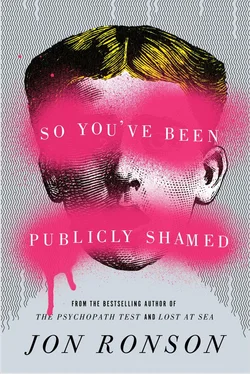Brad told Mary to take the Hot Seat. He pointed to an empty chair.
“What would you say to Amanda if she was sitting opposite you right now?” Brad asked her.
“I’d tell her that I resent her for saying don’t contact me.”
“Say it to her,” said Brad.
“I resent you for saying, ‘Don’t call me,’” Mary said quietly into space.
“See what it feels like to use an angry voice,” Brad said.
“FUCK YOU,” Mary yelled at the empty chair. “I resent you for saying, ‘One day I’m going to marry you,’ and then you didn’t. So FUCK YOU. I resent you because you’re such a fucking bitch sometimes. I resent you for treating me like… I resent you for saying all those beautiful things and you took them all back…” Mary was sobbing.
“Good,” Brad said. “When are you going to say this to her face?”
Mary swallowed. “I’m wondering at what location…”
“Call her up,” Brad told her. “Say, ‘It’s not a request. We’re either going to do this alone or in front of your whole goddamned office and you’ve got one day to make up your fucking mind.’”
“Okay,” said Mary, quietly.
“So, when?” Brad said.
“By next weekend?” Mary said.
“Good,” Brad said.
Jack, a veterinarian sex addict, looked uneasy. “How do you put this approach in the context of people not calling the police?” he asked Brad.
“You’re asking people to leave this session,” I agreed, “and do something to people who aren’t part of this. People must get hurt. The police must get called sometimes.”
“People call the police sometimes.” Brad shrugged. “It takes twenty minutes for the police to get there. So you’ve got twenty minutes to complete all your anger.”
“I can’t imagine this always works out well,” I said.
“That’s because you’ve been brainwashed your entire life about all the terrible things that are going to happen,” Brad said. “Yeah, people get mad. People get upset. But people get over stuff. People worry about what happens in the first five seconds. But I’m concerned about the next five minutes. I’m committed to people staying with each other until they get over this.”
This last part, Brad said, was critical. You remain with the person you’ve just been yelling at until the resentments fizzle. That’s how wounds heal.
Vincent — the man who was regretting signing up for the course — suddenly announced, “I’m sorry. I’m leaving. This isn’t for me. I’m sorry.”
“I resent you for saying you’re leaving,” said Melissa.
“Okay,” said Vincent.
“I don’t think I’ll ever get over this resentment,” said Melissa.
Wow, I thought. Give the man a break. She’s only just met him. “I resent you telling him that you’ll never get over the resentment of him leaving,” I told Melissa.
“I appreciate you for sitting there listening to me,” Melissa said to Vincent.
“Thank you,” Vincent said.
“Shit or get off the pot, man,” said Jack the veterinarian sex addict. “I resent you for saying you’re leaving and I resent that you’re still here.”
Vincent left.
The day’s session ended. I said I hoped nobody minded but I was tired so I wasn’t going to have dinner with the group. I was just going to watch TV and send some e-mails instead.
“I feel slighted,” said Brad.
“Ach, no you don’t,” I said. Although I knew that he did.
• • •
There was a reason I needed to go to my room that I hadn’t explained to anyone. I had a work crisis. A story I’d been working on had turned chaotic, and my editor and I were at loggerheads, sending each other tense e-mails.
It had sounded like an intriguing story at the beginning. There has been a tradition over the years of journalists wearing disguises to experience injustice firsthand. The pioneer was John Howard Griffin, who in 1959 stained his skin dark and spent six weeks hitchhiking as a black man through the segregated Deep South — a journey chronicled in his 1961 book Black Like Me . From time to time, editors have asked me to undertake similar journeys. After 9/11, a TV producer suggested I stain my own skin and move into a Muslim area of London. But it seemed to me like she basically wanted me to spy on Muslims, so I said no. This time, however, I’d been asked to disguise myself to experience a different injustice.
“We want you to be a woman,” the editor had said. “We’ll work with a prosthetics artist to make you unrecognizable. We’ll get a movement coach to teach you how to walk like a woman.”
“Women and men walk differently?” I asked.
“Yes,” she said.
“I never knew that,” I said. “This could be really interesting. As a man, I’m rarely stared at lasciviously. But as a woman, I might get stared at lasciviously a lot. How would that make me feel ? And do women behave differently when there are no men around — like at women-only gyms and women-only saunas? I’m intrigued. I’ll do it.”
—
So I met with a prosthetics artist at a college in West London. She encased my face in alginate and took a cast. A prosthetic mask was made. She spent a couple of weeks manipulating it into womanly features. I slipped it over my face. I looked like a woman with a gigantic head. The editor called me in for a meeting.
“It’s fine,” she said. “Don’t worry. We won’t use the prosthetic head. We can still make you look exactly like a woman.”
“Are you sure?” I said.
“You’ll be amazed what a few hours with the movement coach will do,” she said.
“You don’t think we’re in danger of relying too much on the movement coach?” I said. “It had been the prosthetics that had rather sold me on the idea.”
“I promise you that we won’t let you out of this building unless you absolutely pass as a woman,” she said.
—
So, in an empty conference room in a quiet corner of the magazine’s offices, I dressed as a woman. Makeup was applied. I put on a wig and a dress and a padded bra. I spent hours under the tutelage of the movement coach. Test photographs were taken. Finally, I left the conference room and walked toward the editor’s desk in the manner that the movement coach had instructed.
She swallowed slightly when she saw me.
“They’ve done an incredible job,” she said. She turned to the deputy editor. “Haven’t they done an amazing job?”
The deputy editor swallowed slightly. “Yes,” she said.
“You look exactly like a woman,” said the editor. “Now go outside and experience life as a woman.”
“I don’t think I look like a woman,” I said.
“What are you talking about?” said the editor. “You look exactly like a woman.”
“I don’t think I look anything like a woman,” I said.
She peered at my tormented facial expression.
I hesitated for a moment. Then I walked toward the exit. Sweat smudged my foundation. I glanced back over my shoulder at the editors. They were giving me encouraging looks and indicating the door. I felt sick, short of breath. My stomach muscles clenched.
And then I stopped. I couldn’t do it. I turned, went back downstairs, and I put on my male clothes.
—
A week had passed and our relationship remained frosty. She felt I had prevaricated unprofessionally and was acting too sensitive. “Don’t over-think it, Jon,” she’d e-mailed me. “It’s just a fun feature. Shouldn’t be the cause of some sort of a midlife crisis.” I felt that the story’s original premise had fallen to pieces and the reason they were happy to send me out into the world looking nothing like a woman was that in our line of work the more humiliated a person is, the more viral the story tends to go. Shame can factor large in the life of a journalist — the personal avoidance of it and the professional bestowing of it onto others.
Читать дальше












